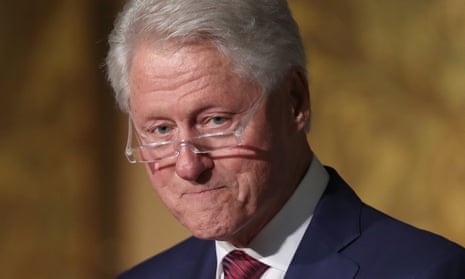In 1998, I was a young lawyer at the Now Legal Defense and Education Fund specializing in sexual harassment law. The US supreme court had just cleared the way for Paula Jones to sue President Clinton, ruling that he was not entitled to immunity from civil litigation for acts committed before he assumed office.
I no longer practice law, but one of the few things I’ve kept in a file is the legal memorandum I wrote assessing Jones’s legal claims against Clinton. I don’t know why I’ve never thrown it away. Maybe the situation never felt resolved to me. Maybe I hoped that the day would come when sexual harassment would be recognized more fully.
When Jones filed suit, I was assigned the task of analyzing the merits of her case. I concluded that, if true, Clinton’s alleged propositioning of Jones when he was governor of Arkansas and she was a secretary constituted an extreme abuse of power that amounted to sexual harassment.
Even if there was no physical contact, the verbal request that she submit to his sexual advances carried with it a threat of retaliation or promise of reward, which constituted a quid pro quo. My analysis hinged on the extreme power differential between the two of them.
Even though there was a strong argument for sexual harassment under the law, the court of public opinion – including opinions of those on the left – were far less fair. Democratic operative James Carville memorably said of Paula Jones: “If you drag a $100 bill through a trailer park, you never know what you’ll find.” She and other Clinton accusers were branded as “nuts or sluts”.
Paula Jones was represented by the Rutherford Institute, a rightwing shop making a name for itself in anti-abortion cases. Her lawyers certainly did not know much about sexual harassment law. The hard question, of course, is whether we would have taken on Paula Jones as a client. I’d like to say the answer is yes, but I seriously doubt it.
Building on my research, we did eventually file a friend of the court brief on behalf of neither party. We weighed in on the law without openly supporting Jones or defending Clinton. The National Organization for Women, honoring the views of its membership, stayed out of the case entirely.
Feminists famously coined the phrase, “the personal is political”. My personal reckoning is inspired by the #MeToo movement, which has raised powerful personal memories.
There was the creepy camp counselor who gave 13-year-old me a violin lesson every day at music camp, and clearly wanted more physical interaction than I was comfortable having with an adult.
There was the teaching assistant who occasionally taught me and once forcibly kissed 16-year-old me in my parent’s basement. There was the pianist who performed and rehearsed with me and who initiated a sexual relationship with me the summer after I graduated from high school. All of these men were 10-15 years my senior.
These experiences did not embitter or harm me in a lasting way. They simply were the precursor to things that happened later. There was the peeping Tom who used to jerk off outside my window when I was in law school. There were the stalker-like voicemails I received after appearing as an expert on television talking about, ironically, sexual harassment.
There was the time my building superintendent’s father offered me $20 for sex the day I was locked out after a morning jog. There was the run-of-the-mill harassment I experienced walking down the streets of New York or riding the subway.
Looking back on it all now, I feel a mixture of shame, bemusement and anger. It wasn’t all OK, but at the time, I accepted it. Just as I did not reckon with the full truth of my own experiences, I did not open myself to the truth of Paula Jones’s story.
I did my best to analyze her legal claims fairly, but I let my superiors decide what to do with the analysis. We never seriously attempted to assess the credibility of her claims. We didn’t do right by Jones and other Clinton accusers, but our actions were shaped by the politics and societal norms of the time.
Amazingly, we are now at a cultural moment where many women (and some men) are courageously coming forward to tell stories about harassment. The #MeToo movement teaches that sexual abuse and harassment are far more prevalent than previously acknowledged.
Are we finally learning to recognize the abuse of power wherever it may happen? This rises above party politics. Instead of questioning the motivations of the accusers, we should listen to them. Let them tell their stories. I hope that more will speak up when they see sexual harassment or the abuse of power. Only then can we end our shameful culture of silence.
- Yolanda Wu is a violin teacher who formerly worked as a women’s rights attorney and law professor
